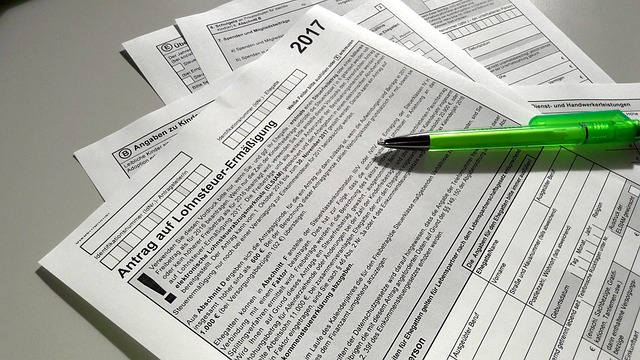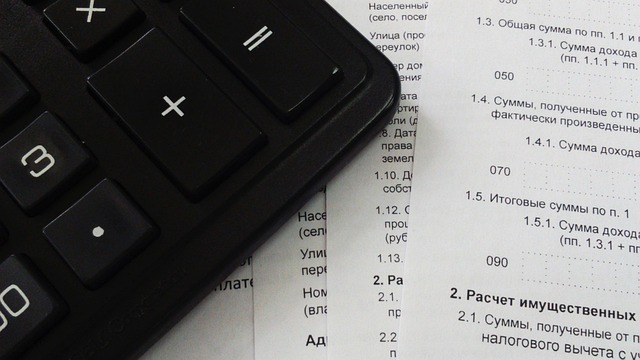Navigating Tax Compliance: The Vital Role of Accurate UK Translation Services
In today's global economy, Tax Documents UK translation services are essential for businesses expanding across borders. These services ensure precise communication and accurate interpretations of complex tax regulations, varying by jurisdiction……..

In today's global economy, Tax Documents UK translation services are essential for businesses expanding across borders. These services ensure precise communication and accurate interpretations of complex tax regulations, varying by jurisdiction. They employ qualified translators with taxation expertise to preserve original meaning while adhering to local terminology and regulations. By prioritizing specialized providers with rigorous quality control measures and professional certifications, companies can avoid legal issues and penalties, facilitating smooth navigation of the intricate UK tax landscape. Advanced technologies like machine translation and AI drive innovations, promising enhanced efficiency and accuracy in the future.
In today’s globalized business landscape, accurate tax document translation services are indispensable for navigating complex international tax regulations. The UK, with its diverse linguistic environment, requires meticulous handling of tax paperwork to avoid legal pitfalls. This article delves into the critical aspects of tax document translation, exploring challenges like language barriers and their impact on compliance. We examine the role of professional translation services, key considerations when choosing providers, quality assurance, legal aspects, successful case studies, and emerging technologies that enhance efficiency in tax translation.
- Understanding the Importance of Accurate Tax Document Translation
- Challenges in Tax Documentation: Language Barriers and Their Impact
- The Role of Professional Translation Services in Tax Compliance
- Key Considerations When Choosing a Tax Document Translation Provider
- Quality Assurance Processes for Tax-Related Translations
- Legal and Regulatory Aspects of Tax Document Translation in the UK
- Case Studies: Successful Tax Translation Projects
- Emerging Technologies in Tax Document Translation Services
- Future Trends: Enhancing Efficiency in Tax Translation
Understanding the Importance of Accurate Tax Document Translation

In today’s globalised economy, businesses and individuals with international connections often find themselves navigating complex tax landscapes. This is where accurate tax document translation services step in as a vital component of compliance and success. When it comes to tax affairs, precision and clarity are paramount; one small error or misinterpretation can lead to significant consequences, including hefty fines and legal issues.
Tax documents UK translation services play a crucial role in ensuring that financial information is accurately conveyed across different languages. These services employ qualified translators with expertise in taxation who understand the nuances of both the source and target languages. They go beyond simple word-for-word translations, aiming to preserve the original meaning while adhering to local tax regulations and terminology specific to each jurisdiction.
Challenges in Tax Documentation: Language Barriers and Their Impact

In today’s globalised business environment, companies often operate across borders, expanding their reach and market presence. However, this expansion comes with a complex web of tax obligations in each country. Tax documents, by nature, are highly technical and specific to each jurisdiction, making them challenging to interpret. One of the primary hurdles in effective tax compliance is the language barrier. When dealing with tax matters, accuracy is paramount; even minor misinterpretations can lead to significant errors, penalties, or legal issues.
In the UK, for instance, where a diverse range of languages is spoken, tax document translation services are in high demand. These services ensure that businesses and individuals receive accurate interpretations of their tax obligations, enabling them to navigate the intricate tax landscape with confidence. Professional translation ensures compliance, facilitating smooth interactions between taxpayers, HMRC (Her Majesty’s Revenue and Customs), and other regulatory bodies.
The Role of Professional Translation Services in Tax Compliance

In today’s globalised economy, businesses operating across borders require seamless tax compliance to avoid legal issues and penalties. This is where professional tax document translation services step in as a vital component of effective tax management. With complex tax regulations varying from country to country, accurate translations are essential to ensure that financial information is understood and interpreted correctly by tax authorities.
In the UK, for instance, businesses often need to translate tax forms, contracts, and correspondence with international clients or partners. Professional translation services employ language experts who are not only fluent in multiple languages but also have a deep understanding of tax terminology and concepts. This expertise ensures that technical terms and nuanced information are conveyed precisely, minimising the risk of errors that could lead to costly consequences.
Key Considerations When Choosing a Tax Document Translation Provider

When selecting a tax document translation service, particularly for documents related to taxation in the UK, several crucial factors come into play. Firstly, consider the provider’s expertise and specialisation. Look for companies that have extensive experience in translating financial and legal documents, especially tax-related materials, to ensure accuracy and compliance with local regulations. Tax Documents UK translation services should ideally employ translators who are not only fluent but also well-versed in accounting and taxation terminologies.
Another key consideration is quality assurance. Reputable providers will have rigorous quality control measures in place, including multiple rounds of reviewing and editing by subject matter experts. This ensures that the final translated document is error-free and maintains the integrity of the original content. Additionally, obtaining professional certifications such as ISO 17100 for translation services can give you confidence in their capabilities.
Quality Assurance Processes for Tax-Related Translations

When it comes to tax documents, precision is paramount. UK translation services catering to this niche must implement rigorous Quality Assurance (QA) processes to ensure accuracy and compliance. This involves a multi-step approach, starting with thorough pre-translation analysis. Linguists carefully study the source document, identifying complex terminology, legal jargon, and specific tax regulations unique to the UK context.
Next, a team of subject matter experts reviews the translations for factual integrity and adherence to tax laws. This validation ensures that all terms and figures are correctly interpreted and presented in the target language. Additionally, advanced QA tools, such as term base management systems and machine translation memory, help maintain consistency across large volumes of documents, further enhancing accuracy and efficiency in providing top-quality Tax Documents UK translation services.
Legal and Regulatory Aspects of Tax Document Translation in the UK

In the United Kingdom, tax document translation services play a critical role in ensuring compliance with legal and regulatory frameworks. Accurate translations are essential to avoid penalties and maintain the integrity of financial reporting. The UK’s tax authorities, like HM Revenue & Customs (HMRC), require all tax-related documents to be translated professionally, especially when dealing with non-English language submissions. This is to guarantee that the information is correct and accessible, promoting fairness in the tax system.
Professional translation services must adhere to specific standards set by the industry and legal requirements. These include using qualified translators who are experts in both the source and target languages, ensuring confidentiality, and maintaining the accuracy of technical terms related to taxation. Compliance with these aspects not only facilitates smoother tax processes but also safeguards individuals and businesses from potential legal issues arising from mistranslations.
Case Studies: Successful Tax Translation Projects

When it comes to tax documents, accuracy is paramount. That’s why case studies showcasing successful tax translation projects are invaluable for businesses and individuals navigating complex multilingual tax scenarios in the UK. These real-world examples highlight the importance of professional, native-level language expertise in ensuring compliance and avoiding costly errors.
For instance, consider a multinational corporation expanding into the UK market. Accurate translations of financial records, tax forms, and legal documentation were crucial for seamless integration. A reputable Tax Documents UK translation service, leveraging advanced technology and industry-specific terminology, delivered precise, culturally sensitive translations, enabling the company to navigate the intricacies of British taxation effectively.
Emerging Technologies in Tax Document Translation Services

The digital transformation has brought about a surge in innovative technologies, and tax document translation services have not been left behind. Advanced machine translation (MT) platforms are now capable of providing quick, cost-effective, and relatively accurate translations for tax-related documents in the UK. These tools use neural networks and large language models to deliver more natural and contextually appropriate translations compared to traditional methods. This is particularly beneficial for businesses dealing with international tax obligations, as it streamlines the process and reduces potential errors.
One of the emerging trends in this field is the integration of Artificial Intelligence (AI) and Machine Learning (ML). By training algorithms on vast datasets of tax documents, these technologies can improve translation accuracy over time. They can also adapt to specific industry terminology and local regulatory nuances, ensuring that translations are not just word-for-word but also compliant with UK tax laws. This cutting-edge approach promises to make tax document translation more efficient, accurate, and accessible, benefiting both businesses and tax authorities alike.
Future Trends: Enhancing Efficiency in Tax Translation

As technology continues to evolve, so do the expectations for efficiency and accuracy in tax document translation services in the UK. Automation is set to play a significant role, with machine learning algorithms enhancing speed and consistency. AI-powered tools can analyse vast amounts of data, learn from patterns, and adapt to different linguistic nuances, ensuring precise translations that capture complex fiscal terminology accurately. This technology can streamline processes, reduce human error, and enable faster turnaround times, benefiting both tax professionals and their clients.
Another emerging trend is the integration of Neural Machine Translation (NMT). NMT uses deep learning techniques to produce more natural-sounding translations with improved context understanding. It can handle complex sentences and idiomatic expressions better than traditional methods, ensuring that tax documents are translated not just word for word but also logically and culturally appropriate. This advancement promises to elevate the quality of tax document translations, fostering greater international cooperation and compliance in a globalised fiscal landscape.
Accurate tax document translation services are indispensable in today’s globalized economic landscape, especially within the UK. Navigating complex legal and regulatory aspects requires expertise and precision to avoid costly mistakes. By leveraging professional translation services and adhering to strict quality assurance processes, businesses can ensure compliance and streamline their tax affairs. Emerging technologies further enhance efficiency, promising a future where tax translation is faster, more accessible, and less prone to errors. When choosing a provider, it’s crucial to consider their experience in handling tax-related documents, security measures for sensitive data, and adherence to industry standards, ensuring a reliable partner for all your tax document translation needs in the UK.






